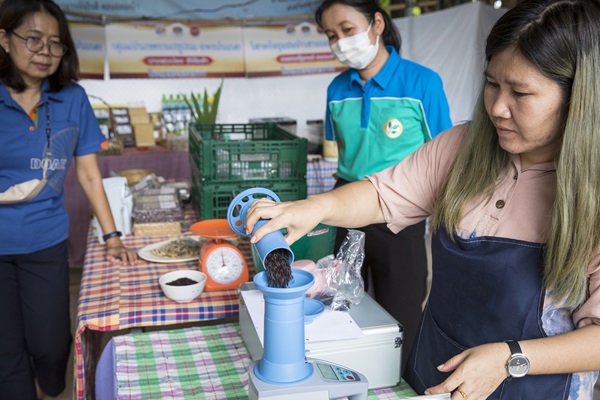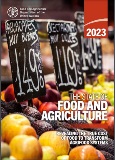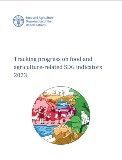Australia
News

Strengthening climate resilience, adaptation and mitigation through food loss and waste reduction
01/12/2023

International Day of Awareness of Food Loss and Waste: FAO calls for circular model in agrifood systems
29/09/2023

We Can All Help Reduce Food Loss and Waste | UN Chronicle
28/09/2022
Reducing food loss and waste represents a “triple-win” opportunity—for the climate, for food security and for the sustainability of our food systems. It must be a priority in these times of rising food insecurity, malnutrition and hunger across the globe.
For many of us on the planet tod...
Articles
Research and Technologies to Reduce Grain Postharvest Losses: A Review
14/06/2024
A substantial portion of cereal grain goes to waste annually due to a lack of science-based knowledge, unconscious handling practices, suboptimal technical efficiency, and inadequate infrastructure. This article extensively reviews losses occurring during postharvest operations across various crops, examining diverse postharvest operations in different countries.
Global food loss and waste estimates show increasing nutritional and environmental pressures
29/01/2024
Accurate global food losses and waste (FLW) quantification remains challenging owing to limited harmonized global estimates, a lack of comprehensive quantification approaches and an absence of frameworks for addressing FLW challenges. Here we compile a country-level database that assesses FLW acr...
Why does Australia need to mitigate food loss and waste to ensure food security?
18/03/2024
Food waste in Australia is causing a massive financial burden on the country, with an estimated annual cost of $36.6 billion. Several factors, such as food loss and waste (FLW), inflation, unemployment, and low income, concurrently contribute to Australia's food insecurity problem. This study mai...
Events
16/ 10
2023
World Food Day 2023 - Water is Life. Water is Food
Rome (Italy), Hybrid Event, 16/10/2023
This year World Food Day theme is “Water is life, water is food. Leave no one behind”. It spotlights how water is essential to life on Earth and the foundation of our food.
As rapid population growth, urbanization, economic development, and climate change put the planet’s water resources under increasing stress, the campaign will look at solutions and call for action to produce more fo...
12/ 12
2022
Masterclass on Reducing Food Loss and Waste Targeting Youth
Virtual Event, 12/12/2022
A Food Loss and Waste Master class will be held in December 2022. This virtual event will be addressed to youth who want to discover more about the causes of food loss and waste and solutions to achieving the SDG 12.3 target.
Projects
| Title | LEG - Donate food: feed people, not landfill |
|---|---|
| SDG(S) |
Publications

The State of Food and Agriculture 2023 - Revealing the true cost of food to transform agrifood systems
07/11/2023
Agrifood systems generate significant benefits to society, including the food that nourishes us and jobs and livelihoods for over a billion people. However, their negative impacts due to unsustainable business-as-usual activities and practices are contributing to climate change, natural resource degradation and the unaffordability of healthy diets.

Tracking progress on food and agriculture-related SDG indicators (2023)
25/09/2023
At the mid-point of the Agenda 2030 for Sustainable Development, there is an urgent need to understand where the world stands in eliminating hunger and food insecurity, as well as in ensuring sustainable agriculture. The new report of the Food and Agriculture Organization of the United Nations (FAO), titled Tracking progress on food and agriculture-related SDG indicators, offers analysis and trends on indicators across eight Sustainable Development Goals (SDGs).

Food Science and Technology Solutions to Improve Food and Nutrition Security: Reducing Food Loss & Valorizing Food Processing Side Streams
31/12/2022
In 2022, the Institute of Food Technology/Food and Nutrition Security Steering Committee hosted a virtual roundtable discussion on their first challenge, “Food Science & Technology Solutions for Reducing Food Waste and Valorizing Waste Streams” on November 1 – 2, 2022. The goal was to identify current and potential future solutions from food science and technology that can contribute to the reduction of food loss and valorization of food processing side streams.
Multimedia
International Day of Awareness of Food Loss and Waste - UN Secretary General message | 29 September 2020
29/09/2020
António Guterres, UN Secretary-General on the occasion of the International Day of Awareness of Food Loss and Waste (29 September 2020)
FAO Goodwill Ambassador Diarmuid Gavin makes a call to action for reducing food loss and waste
29/09/2022
Marking International Day for Awareness of Food Loss and Waste, FAO National Goodwill Ambassador for Ireland Diarmuid Gavin reminds us that 31 % of total greenhouse gas emissions are attributable to the food system. He calls for all of us to act in order to maximize the use of food produced and to reduce food loss and waste.
How to tackle food loss and waste
14/10/2019
Although there may be an economic loss, food diverted to other economic uses, like animal feed, is not considered as food loss or waste, nor are the inedible parts of food products.
